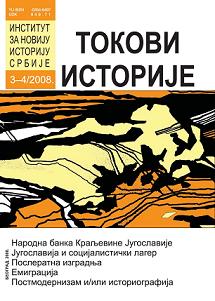ПРИКАЗИ
Author(s): Author Not Specified / Language(s): Serbian
/ Issue: 3-4/2008
Zdeněk Mahler, Ano, Masaryk, Nakladatelství Slávka Kopecká,
Praha, 2007. (Мр Милан СОВИЉ)
Српска теологија у двадесетом веку. Истраживачки проблеми
и резултати, приредио Богољуб Шијаковић, Београд, 2007.
(Мр Слободан СЕЛИНИЋ)
Добрило Аранитовић, Биобиблиографија академика Миомира
Дашића, ЦИД, Подгорица, 2007. (Др Момчило ИСИЋ)
John Bree (ur.), Yasukuni, The War Dead and the Struggle for
Japan’s Past, Hurst & Company, London, 2007. (Др Олга
МАНОЈЛОВИЋ ПИНТАР)
Дмитар Тасић, Рат после рата. Војска Краљевине Срба, Хрвата
и Словенаца на Косову и Метохији и у Македонији 1918–1920,
Утопија и Институт за стратегијска истраживања, Београд, 2008.
(Мр Александар ЖИВОТИЋ)
Bogdan Musial, Kampfplatz Deutschland. Stalins Kriegspläne
gegen den Westen, Berlin (Propiläen-Verlag), 2008. (Др Зоран
ЈАЊЕТОВИЋ)
Boris Kanzleiter, Krunoslav Stojaković (Hrsg.), 1968 in
Jugoslawien. Studentenproteste und kulturelle Avantgarde
zwischen 1960 und 1975, Verlag J. H. W. Dietz Nachf., Bonn,
2008. (Др Петар ДРАГИШИЋ)
Денда Далибор, Аутомобил у српској војсци: 1908–1918,
Одељење за транспорт СМР МО Р Србије, Београд, 2008.
(Мр Aлексеј ТИМОФЕЈЕВ)
People on the Move. Forced population Movements in Europe
in the Second World War and Its Aftermath, BERG, Oxford, New
York, 2008. (Pertti Ahonen, Gustavo Corni, Jerzy Kochanowski,
Rainer Schulze, Tamаs Stark, Barbara Stelzl-Marx),
(Мр Сања ПЕТРОВИЋ ТОДОСИЈЕВИЋ)
Милан Гаковић, Савез земљорадника (Земљорадничка
странка) 1919–1941, (приредио Здравко Антонић), Академија
наука и умјетности Републике Српске, Монографије књ. VI,
Одјељење друштвених наука, књ. 19, Бањалука, 2008.
(Мр Горан ЛАТИНОВИЋ)
Povratak u šezdeset osmu – 40 godina od protesta (priredila
Nora Farik), Fondacija „Heinrich Böll“ – Regionalni ured Beograd,
(Душан МАРКОВИЋ)
А. Б. Едемский, От конфликта к нормализации. Советско-
-югославские отношения в 1953–1956 годах, Российская
академия наук. Институт славяноведения, Наука, Москва, 2008.
(Мр Александар ЖИВОТИЋ)
More...

